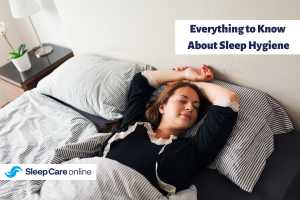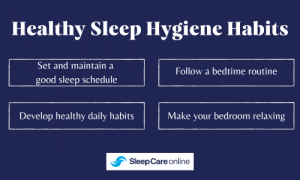Key Takeaways
- Getting the proper amount of sleep impacts a person’s overall health and well-being.
- Maintaining good sleep hygiene results in better moods and more productivity during the day, and promotes consistent use of routines to be better structured.
- There are many steps a person can take to improve their sleep hygiene. They include developing healthy habits, having a consistent bedtime, and more.
Just as we take steps to maintain personal hygiene every day, so should we consider the best way to maintain sleep hygiene for better health. Having good sleep hygiene is important so that people are getting the most out of their sleep. Sleep hygiene can include keeping a consistent sleep schedule, having a comfortable and relaxing bedroom, and following a bedtime routine that can be done every night.
Being aware of your sleep hygiene and getting into a proper routine is the best approach. Not only will strong sleep hygiene impact sleeping patterns and habits, but it also impacts the next day after a full night’s sleep. Better sleep hygiene results in better sleep, which improves a person’s mood and the functionalities of the day ahead. Having a good bedtime routine and other healthy habits contribute to strong sleep hygiene that will set up people for success when sleeping and beyond.
Why Should You Practice Good Sleep Hygiene?
Having the proper amount of sleep contributes to better physical and mental health. Maintaining proper sleep results in a better quality of life. Getting enough sleep per night positively affects growth and stress hormones, the immune system, appetite, mood, and more. Good sleep can even aid in positively impacting blood pressure and other illnesses. Sleep is important for people of all ages, so having good sleep hygiene and nighttime routines can assist in receiving a better night’s sleep.
Most of us can adapt quickly to healthy routines, so we can make our habits serve our long-term interests. Building an environment and set of routines that promote our goals can really pay off for better sleep and better health.
What Are the Signs of Bad Sleep Hygiene?
Any behaviors that make you feel that you are not getting the sleep you need are the best indicators of poor sleep hygiene. You may have bad sleep hygiene if:
- You have a hard time falling asleep
- You experience frequent sleep disturbances throughout the night
- You are sleepy during the day even after waking up from a night’s rest
- You do not sleep consistently throughout the night
- You have an erratic sleep schedule including naps during the day or periods of sleeplessness at night
How Can You Maintain Good Sleep Hygiene?
Set and Maintain Your Sleep Schedule
Keeping a consistent bedtime helps your body and mind prepare for sleep every night. Try to establish a set time and stick to it. You may even find yourself getting sleepy as your set bedtime nears. It does not matter if you prefer to go to bed early or like to stay up late. As long as you maintain that sleep schedule every night, you can assist your body and mind to get ready for sleep.
Erratic sleep schedules cause most of the issues with poor sleep. Your body does not have a chance to adjust to a sleep pattern when you shift sleep times. Often people who work pivoting work hours will experience sleep disorders as a result of a disruptive sleep schedule.
Follow A Bedtime Routine
Bedtime routines help prepare your body and mind for sleep through conditioning. Erratic sleeping schedules can lead to sleep disorders and eventually health-related issues, so a bedtime routine is as important as diet and exercise for your well-being.
By maintaining a consistent bedtime routine, much as we do for children, we can help regulate proper sleep habits for ourselves. Eliminating chaos in our bedtime schedules and establishing order in our sleep patterns helps the body adjust and attune to peaceful sleep.
Healthy bedtime routines involve consistent sleep times and pre-bedtime behaviors that gently prepare you for a good night’s rest. Those habits may involve meditation, yoga, aromatherapy, or avoiding electronic devices and heavy meals before going to bed.
Develop Healthy Daily Habits
Much of healthy sleep can be improved by what we do during the daytime as part of an overall health regimen. Healthy daily habits may include a range of lifestyle choices. A healthy diet and regular exercise both contribute to better sleep every night. Avoiding alcohol and smoking can also help improve our overall health as well as our sleep health. Maintaining a healthy weight not only improves sleep but also curbs the symptoms of sleep disorders like sleep apnea.
Managing stress is also important for improving sleep. Too much stress can leave you alert with racing thoughts and anxious emotions. Meditation, yoga, and even a mindful approach to life can be a daily, healthy habit that provides peaceful sleep at night.
Make Your Bedroom Relaxing to Encourage Sleep
Your bedroom should be a sleep sanctuary. As part of your bedtime routine, turn down your bed covers, plump your pillows, and dim the lights to create an atmosphere that is inviting for restful sleep. Even as you perform other pre-bedtime activities such as meditation in other places in the home, your prepared bedroom is waiting for you to lie down and sleep. Be sure to avoid turning blue light electronic devices in your bedroom. Try to include soothing music and pleasant, sleep-encouraging fragrances such as lavender.
Try to avoid other activities such as reading and watching TV in the bedroom. These habits can blend your daytime habits with your nighttime bedtime routine. Good sleep hygiene helps your mind and body distinguish between what you do during the day and how you recharge during the night.
Can Sleep Hygiene be The Same for Everyone?
Sleep hygiene is not a rigid practice that applies to everyone. Try out different ways to improve your sleep hygiene to find the right pattern that works for you. Be comfortable with your sleep habits and try to keep them consistent once you figure out what sleep schedule and what pre-bedtime sleep habits are ideal for you and your lifestyle.
Just know that sleep disorders like sleep apnea can affect your health and may require more than just changes in your sleep hygiene.
How Does Sleep Hygiene Affect the Chances of Developing Sleep Apnea?
While sleep hygiene is helpful for good sleep and can help with sleep apnea, it cannot prevent it. If you have sleep apnea, then you may have to include CPAP therapy as part of your bedtime routine. Staying CPAP compliant along with a healthy sleep schedule can help reduce the instances of apneas throughout the night, so you sleep better.
Sleep apnea however is probably not the result of a poor sleep schedule. You need to follow the recommendations from a doctor to curb the symptoms and improve sleep. Only a doctor can help you determine the severity of your sleep apnea and provide proper treatment.
Where Can I Get Diagnosed for Sleep Apnea?
If you suspect that you have sleep apnea, the first step is to get an accurate diagnosis. You can do that through a home sleep apnea test from Sleep Care Online. Here is how it works:
- With the Complete Care Package, schedule a 10-minute telehealth visit with a healthcare provider to discuss symptoms, upcoming sleep study, test results, and discuss treatment options.
- A multi-night, disposable home sleep apnea test is mailed to your home to be completed at your convenience.
- A physician analyzes the sleep data and provides a prescription if needed.
- Schedule an optional follow-up appointment (additional fee applies).
- We connect you to sleep experts who can offer customized sleep therapy options, assistance in equipment purchase, and initial set-up.






